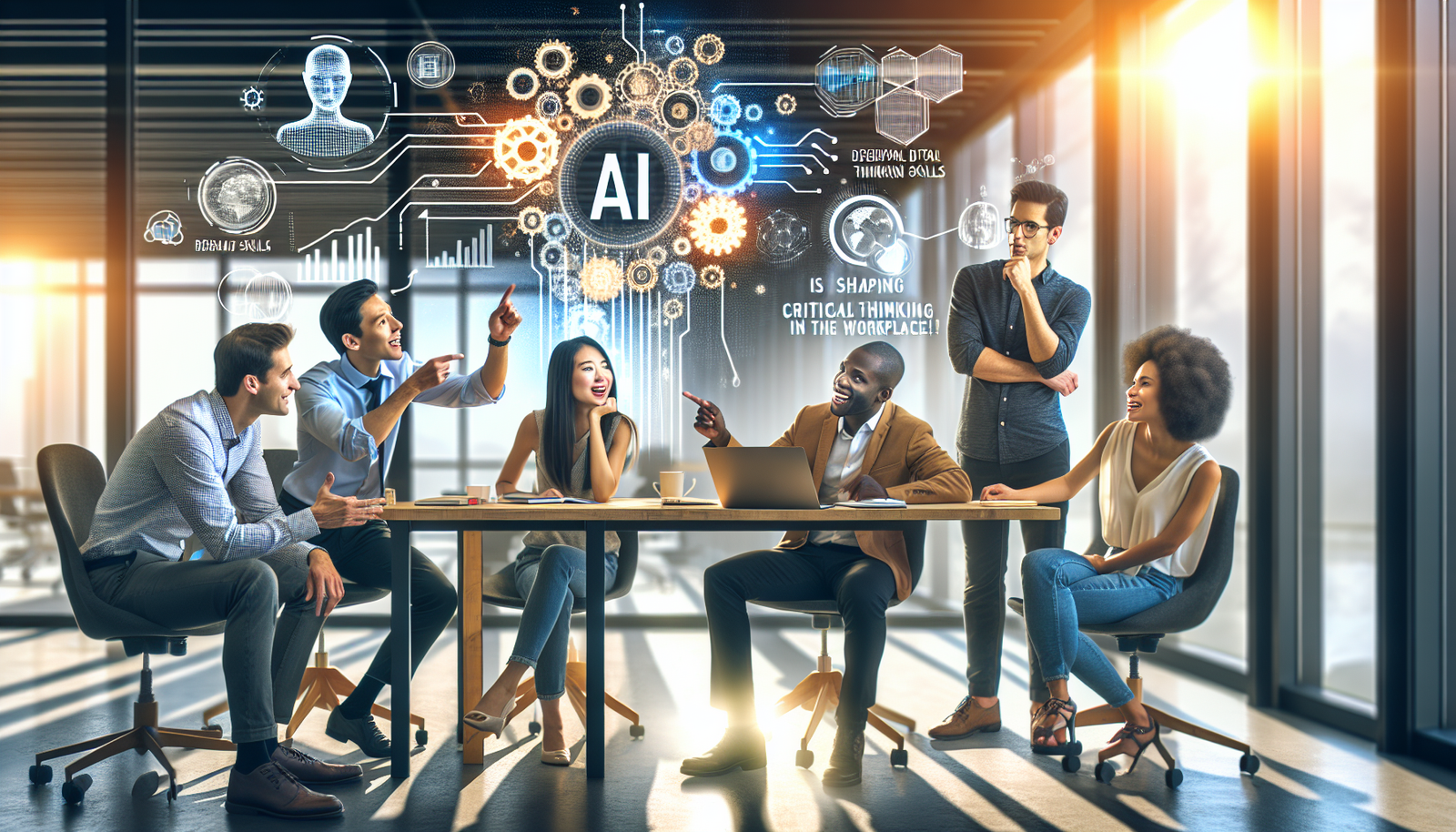Analysis: the impact of artificial intelligence on the development of critical thinking in employees
The transformations induced by artificial intelligence are shaking up the modern professional environment.
*New skills are proving essential to navigate this changing landscape.* The ability to think critically emerges as a key skill, conditioning employees’ adaptation in the face of increasing automation. *The impact of AI transcends the simple technical aspect; it also reshapes human relationships at work.* The challenges related to this delicate balance reveal a major challenge for contemporary companies. *Understanding these dynamics becomes essential to foster a rich and sustainable professional ecosystem.*
Analysis of the impact of artificial intelligence on employees’ critical thinking
The advent of artificial intelligence radically changes professional dynamics and influences how employees develop their critical thinking. AI can be both a supportive tool and a source of intellectual destabilization. The stakes are crucial, as the ability to evaluate, analyze, and question becomes essential in an increasingly automated work environment.
The transformations induced by AI
Many companies are adopting AI solutions to increase their productivity and optimize decision-making processes. This radical change raises questions about the future of employees’ critical skills. Increased reliance on algorithms and automated systems could weaken these skills. Employees may assimilate results without truly analyzing the underlying data, potentially harming the quality of their thinking.
The educational role of artificial intelligence
AI tools can also serve as amplifiers of critical thinking. By providing sophisticated analyses and comparisons, these technologies offer employees the opportunity to question the information provided. For example, advanced language models allow for the confrontation of various viewpoints on a given subject, thus fostering constructive debate. This exposure can enhance individuals’ ability to formulate informed arguments and evaluate information sources.
The challenges posed by automation
One of the main challenges posed by automation is the potential to generate intellectual passivity. Employees, faced with tasks simplified by AI, may lose their habit of analyzing, criticizing, and evaluating situations. This routine can weaken their ability to make informed decisions, making them vulnerable to informational manipulation. The risk of conformity increases, as individuals may blindly follow suggestions generated by AI systems.
Initiatives to strengthen critical thinking
To counter these effects, some companies are implementing tailored training programs. These programs aim to raise employees’ awareness of the importance of maintaining critical thinking in the face of data generated by AI. The training often includes practical exercises that encourage participants to question the results produced by algorithms, dissect sources, and confront analyses. The goal is to cultivate a culture of critical evaluation of information.
The future of critical thinking in the age of AI
An imbalance appears between the opportunities provided by AI and the risks of declining analytical skills. Companies will need to develop strategies to integrate this technology without compromising employees’ cognitive autonomy. Awareness and educational initiatives are proving essential in this fight against the erosion of critical thinking.
Maintaining robust critical thinking will be crucial in a world where AI continues to evolve and make decisions. Organizations that succeed in convincing their employees of the importance of this cognitive complement will not only see an increase in productivity, but also an improvement in the quality of decisions made.
Concrete examples of initiatives
Companies are already engaging in pilot programs to integrate AI while cultivating critical skills. Some invite experts in AI ethics to develop training modules aimed at confronting employees with the ethical challenges posed by these technologies. Such measures promote critical reflection on the impact of technological choices on professional practices.
Another interesting example comes from education, where AI-based simulations are used to enhance students’ reasoning. These immersive experiences present learners with complex scenarios requiring in-depth critical analysis. Results show an improvement in students’ analytical skills, thereby strengthening their readiness for an increasingly AI-connected job market.
It remains essential to continuously question the impact of AI on the development of human capacities. Each technological advance stimulates unique challenges requiring the reflection of all stakeholders involved in the education and professional training process. Decisions made today will shape the professional future of employees and influence their relationships with emerging technologies.
Frequently asked questions about the impact of artificial intelligence on the development of critical thinking in employees
What is the impact of artificial intelligence on employees’ analytical capacity?
Artificial intelligence can enhance employees’ analytical capacity by providing tools that facilitate the evaluation of data and information, thus stimulating critical thinking.
How does the introduction of AI-based tools influence critical thinking within teams?
AI-based tools encourage discussions and debate among team members, which can lead to better evaluation of ideas and the promotion of critical thinking.
Will employees be less critical when using artificial intelligence?
While AI may automate certain tasks, it does not replace the need for human judgment; it should be used as a complement to encourage stronger critical thinking.
How can companies promote the development of critical thinking through AI?
Companies can organize training that integrates AI into decision-making scenarios, thus encouraging employees to think critically about the results generated by these technologies.
What critical skills should employees develop to work effectively with artificial intelligence?
Employees should develop skills in information evaluation, result interpretation, and understanding AI algorithms to strengthen their critical thinking.
What are the risks of excessive dependence on artificial intelligence for employees’ critical thinking?
Excessive reliance on AI can reduce employees’ ability to think autonomously and critically, relying too much on recommendations from intelligent systems without questioning them.
What is the responsibility of leaders in developing critical thinking in the face of AI?
Leaders must promote a culture of questioning and critical analysis while integrating AI tools, ensuring that employees are trained to evaluate and challenge the results obtained.
How can the impact of AI on employees’ critical thinking be measured?
Satisfaction surveys, performance assessments, and case studies can be used to measure how AI influences critical thinking and effectiveness in employees’ work.






